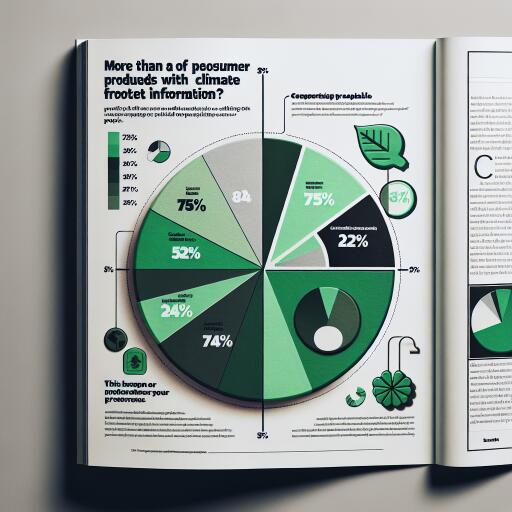
Increasing Consumer Demand for Climate-Friendly Product Information, Reveals New Research
A groundbreaking study has illuminated a significant shift in consumer behavior, revealing that over half (52%) of consumers show a heightened likelihood of buying products that display climate footprint information. This pivot towards environmentally conscious shopping habits underscores a broader awareness and demand for transparency in the environmental impact of products.
The research undertook a comprehensive analysis, pooling insights from a thousand respondents across the United States, the United Kingdom, and Ireland, diving deep into public sentiment on climate labels and the carbon footprint associated with consumer goods.
An astounding 82% of those surveyed expressed a keen interest in being better informed about businesses that significantly contribute to environmental degradation, indicating a push towards corporate accountability in climate issues. Simultaneously, a substantive 50% of participants demonstrated a preference for purchasing food items produced within their own country, linking their buying decisions to the environmental cost of transportation and production.
The study further highlighted generational differences in brand loyalty versus climate consciousness. A notable 46% of Generation Z and Millennial consumers are siding with brands that actively uphold climate commitments, even over their long-time preferred brands. This contrasts with the older demographic (45 years and above), where only 27% would opt for a product bearing a climate-friendly label over their usual brand choice.
Looking towards the future, the survey uncovers a strong consumer advocacy for more stringent regulations surrounding climate labeling. A majority of 61% of respondents are in favor of increasing regulatory measures to ensure products’ climate impact is clearly labeled. This is against a backdrop where nearly 60% of those surveyed believe there is a current lack of knowledge and education on the significance of climate labeling and its effect on combating climate change.
Furthermore, a significant 41% of participants voiced their desire to start choosing products that have a positive climate impact, yet they face uncertainty on how to identify these options. This gap evidences a critical need for heightened visibility and education regarding climate-positive products to empower consumers with the information they need to make environmentally responsible choices.
This insightful study paints a vivid picture of the evolving consumer mindset, showcasing a growing trend towards environmental sustainability and a demand for greater transparency from brands regarding their climate impact. As this consciousness continues to gain momentum, it paves the way for a more sustainable future, driven by informed consumer choices and reinforced by necessary regulatory support.





Leave a Reply